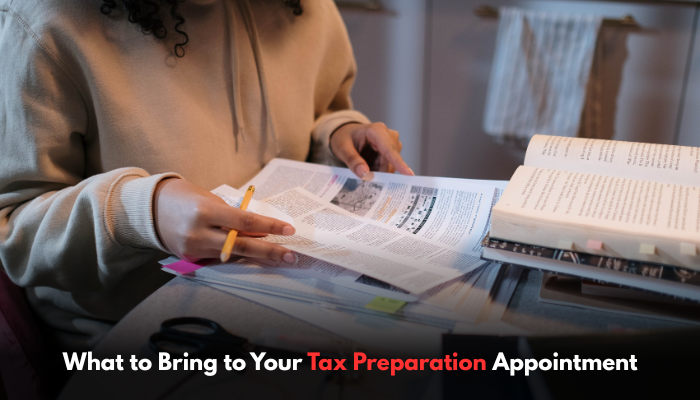When tax season arrives, preparing for your tax preparation appointment can feel overwhelming. Knowing exactly what documents and information to bring not only speeds up the process but also helps ensure accuracy and maximizes your potential refunds. Being organized and well-prepared saves time, reduces stress, and gives your tax professional everything needed to handle your return efficiently.
This article walks you through a detailed checklist of what to bring to your tax preparation appointment, so you can confidently face the filing process with all the essentials in hand.
1. Personal Identification and Basic Information
Your tax professional will need your basic personal information to accurately prepare your tax return. This step may seem obvious, but missing or incomplete details can delay filing or trigger errors.
Make sure to bring:
- A valid government-issued photo ID (driver’s license, passport, or state ID)
- Your Social Security number (SSN) or Individual Taxpayer Identification Number (ITIN) for yourself, your spouse, and any dependents
- Previous year’s tax return for reference (this helps your preparer understand your financial history and potential carryovers)
Having these items ready ensures your preparer can verify your identity and begin accurately compiling your documents.
2. Income Documentation
One of the most critical aspects of tax preparation is reporting your income correctly. Tax preparation requires gathering all forms of income, not just your salary. Bringing comprehensive income records enables your tax preparer to capture your complete financial picture.
Important income documents include:
- W-2 forms from all employers
- 1099 forms (including 1099-MISC, 1099-NEC, 1099-INT, 1099-DIV, 1099-B, etc.) for freelance work, dividends, interest, and capital gains
- Social Security income statements
- Unemployment compensation forms
- Rental income records
- Any other income sources like alimony, gambling winnings, or jury duty payments
By presenting a full set of income documents, you reduce the risk of missed income and potential audits.
3. Expense and Deduction Records
Tax preparation isn’t just about reporting income it’s also about identifying deductions and credits to reduce your taxable income. Collecting relevant receipts and records can make a substantial difference in your final tax bill.
Consider bringing:
- Mortgage interest statements (Form 1098)
- Property tax bills
- Medical and dental expense receipts
- Charitable donation receipts
- Education expenses (tuition statements, student loan interest statements)
- Childcare expenses and provider details
- Business-related expenses if self-employed (receipts, mileage logs, home office expenses)
Providing detailed expense information allows your tax preparer to maximize deductions legally, lowering your tax liability.
4. Banking Information for Direct Deposit
If you expect a refund, having your bank details ready can speed up the payment process through direct deposit. Tax preparation often involves inputting these details so refunds reach your account quickly and securely.
Bring:
- Bank account number
- Routing number
- Type of account (checking or savings)
Confirming this information prevents delays and minimizes errors in refund processing.
5. Health Insurance Documentation
Since the Affordable Care Act requires reporting health insurance coverage, your tax preparation must include relevant health insurance details. This documentation helps avoid penalties and ensures compliance with tax regulations.
Bring:
- Form 1095-A if you purchased insurance through the Marketplace
- Form 1095-B or 1095-C for employer-sponsored or government programs
- Records of any Health Savings Account (HSA) contributions or withdrawals
Supplying your health coverage info aids your preparer in accurately calculating any applicable credits or penalties.
6. Other Important Documents and Information
Certain other items might be needed depending on your individual situation. It’s a good idea to consider any special circumstances that could impact your tax return.
Examples include:
- Records of estimated tax payments made during the year
- Documentation related to any IRS correspondence or notices
- Information on foreign bank accounts or investments
- Records of major life events like marriage, divorce, or birth of a child
- Retirement account contributions and distributions
These additional details help your tax preparer tailor your return to your unique situation, ensuring compliance and potential tax savings.
7. Preparing Questions for Your Tax Preparer
Tax preparation is also an opportunity to clarify uncertainties and seek advice. Prepare a list of questions or concerns to discuss with your tax professional. This proactive approach can uncover tax-saving strategies or help you understand changes in tax laws.
Consider asking about:
- Eligibility for new tax credits or deductions
- Impact of recent life changes on your taxes
- Strategies for reducing tax liability next year
- Recordkeeping best practices for tax preparation
Engaging in this dialogue improves your financial literacy and can make future tax preparation smoother.
Final Insights
Tax preparation can be complex and time-consuming, especially if your financial situation involves multiple income streams, deductions, or special circumstances. For many, outsourcing tax preparation services to a reliable firm offers peace of mind and professional expertise.
If you want to ensure accuracy, compliance, and maximize your refund, consider working with the best outsourcing companies specializing in tax preparation. They combine knowledge, experience, and technology to simplify the filing process and help you stay ahead of deadlines.
Want to manage your finances better? Don’t miss our list of top accounting services for new businesses.


